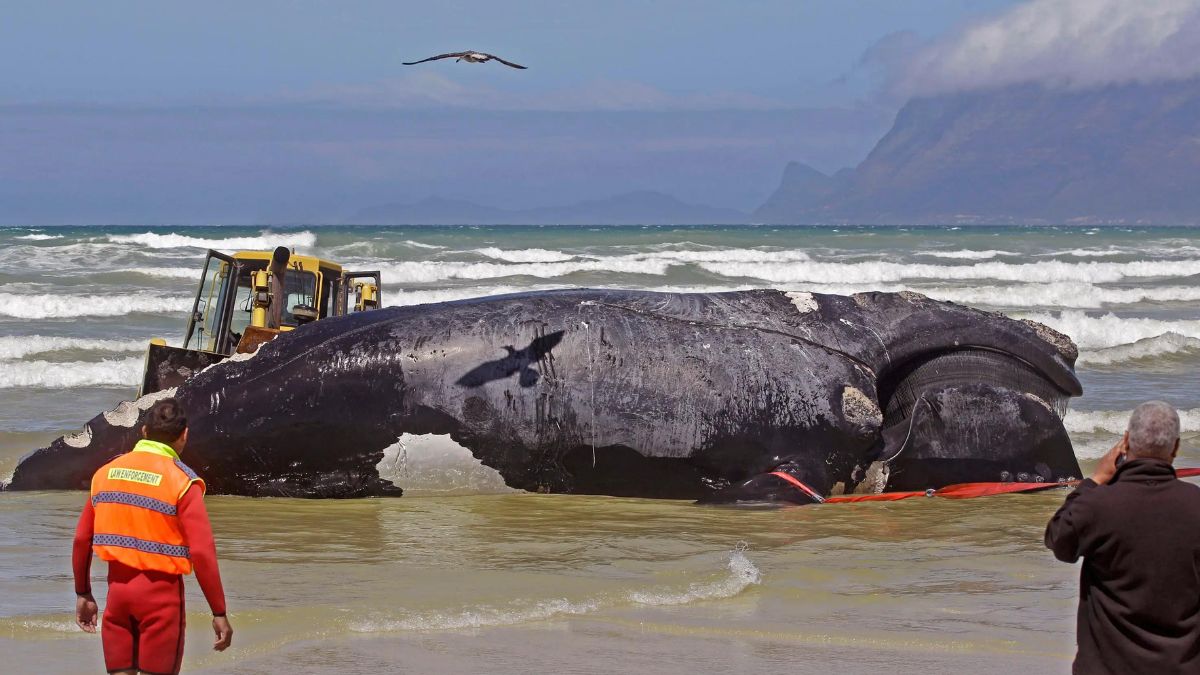An occurrence that occurred not long ago has amazed marine specialists. And curious onlookers amid the endless mystery that is the ocean. An extremely unusual event that has generated equal parts excitement and alarm is the halving of a blue whale Bitten in Half, the biggest animal on the planet.
Blue Whale Biology
Marine ecosystems rely on blue whales, which are enormous but docile, to keep everything in check. Because of their role as filter feeders, they help keep ocean food webs healthy by eating large quantities of krill.
The Incident Unfolds
A gigantic blue whale in an uncharted area of the ocean met a destiny that baffles marine biologists and ocean lovers. The episode, which remains a mystery to this day, occurred in conditions that cast doubt on our knowledge of marine biology.
Predators in the Ocean
Blue whales may be enormous, but they aren’t the only predators out there. The aquatic environment follows a natural food chain with top predators eating lower-level species. To make sense of what happened, you must grasp this dynamic.
Unusual Circumstances
This unusual occurrence may have been caused by a number of things. We may learn a lot about the peculiar circumstances of the blue whale’s demise by investigating the ocean’s complexities and its species’ habits.
Human Impact on Marine Life
As custodians of our planet, we need to think about how we could have contributed to these kinds of disasters. When we look at how humans have affected marine life, we have to ask ourselves if we are doing enough to keep the seas from becoming too imbalanced.
Scientific Response
Quickly reacting to the tragedy, experts and marine biologists began investigating the unusual occurrence by collecting data and conducting tests. The solution to comprehending and avoiding such occurrences in the future may lie in their discoveries.
Previous Unusual Marine Incidents
We can learn about such unusual events affecting marine life from the past. The current situation may be better understood by drawing comparisons with historical events. Which in turn allows for a more thorough examination of the blue whale’s fate.
Media Coverage and Public Reaction
Tragically, word of the blue whale’s demise got out very quickly, drawing both viewers and reporters alike. Hashtags pertaining to the tragedy were trending worldwide, and social media sites were alive with conversation.
Conservation Awareness
This tragedy highlights the critical need for marine conservation efforts. In order to stop more disasters and keep our oceans’ biodiversity intact, it is critical to get the word out about how delicate marine ecosystems are.
The Role of Technology
Modern technological developments have greatly enhanced our capacity to observe and study aquatic organisms. Technological advancements, such as underwater drones and satellite monitoring, are vital in enhancing our knowledge of the seas and enabling conservation initiatives.
Impact on Marine Tourism
The consequences of the tragedy go beyond marine biology. Concerns over the possible effect on marine tourism in the impacted area prompt inquiries into the challenge of striking a balance between commercial concerns and preserving marine ecosystems.
Interviews with Experts
The ecological consequences of the catastrophe have been better-understood thanks to the findings of marine biologists and ecologists. The intricacies involved can be better understood and future marine conservation efforts can be guided by their viewpoints.
Future Implications
We speculate about the future of marine ecosystems as we think about the effects of this unusual event. In order to protect the fragile oceanic equilibrium, it is essential to think about preventative actions.
Conclusion
It is a sobering reminder of how vulnerable even the mightiest marine creatures are that the blue whale Bitten in Half met its awful end. It stresses the need for immediate action in protecting the oceans and prompts us to consider our place as caretakers of the planet.
FAQ’s
Q: Could this incident have been prevented?
A thorough familiarity with marine ecosystems, continuous study, and international conservation initiatives are necessary for the prevention of such infrequent occurrences.
Q: How can individuals contribute to marine conservation?
Supporting marine conservation efforts, and minimizing plastic usage. And remaining knowledgeable about sustainable practices are all ways individuals can make a difference.
Q: What role do governments play in marine conservation?
A: Policies that address climate change, regulate fishing practices. Safeguarding marine habitats is mostly enacted and enforced by governments.
Q: Are there similar incidents documented in history?
As an example of the ocean’s ever-changing and unpredictable character, history documents a handful of unique episodes involving marine life, albeit rare.
Q: What advancements in technology are aiding marine conservation?
A: We learn a lot about marine ecosystems and how to protect them thanks to technologies like genetic analysis, underwater drones, and satellite tracking.
